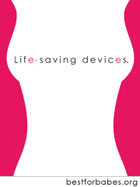Bottle-Feeding Moms Ignored
Many feel pressured to breast-feed and ill-informed about alternative, researchers find
Posted July 14, 2009
TUESDAY, July 14 (HealthDay News) -- The lack of information and support for mothers who bottle-feed could put the health of their infants at risk, say British researchers who reviewed 23 studies that included more than 13,000 participants.
Most infants will receive some formula milk during their first year of life, even if their mothers have decided to breast-feed, said Dr. Rajalakshmi Lakshman and colleagues, from the University of Cambridge. Variations in bottle-feeding can have long-term health consequences for children, they noted.
Their review of published studies identified several common themes:
Some mothers who bottle-fed -- either because they couldn't breast-feed or because they prefer to bottle-feed -- experienced negative emotions such as guilt, worry about the impact on their baby, concern about health professionals' opinions, uncertainty about how to proceed, a sense of failure and anger at feeling pressure to breast-feed.
Some mothers said they didn't receive enough information on correct bottle-feeding techniques, which made it difficult to make decisions about whether they should bottle-feed and left them unsure about proper feeding frequencies and quantities.
It was common for mothers to make mistakes in bottle-feeding preparation. Incorrect preparation can increase the risk of infection, promote excessive weight gain or leave babies undernourished.
Some mothers who bottle-fed felt that hospital midwives spent far more time with breast-feeding mothers.
The findings appear online July 14 in the journal Archives of Disease in Childhood.
It's important to promote breast-feeding because it's the healthiest option for both mother and baby, said the authors. But they added that it's "also necessary to ensure that the needs of bottle-feeding mothers are met ... Inadequate information and support for mothers who decide to bottle-feed may put the health of their babies at risk."
If health-care professionals don't provide correct information about bottle-feeding, mothers will seek help from family and friends, which may increase the risk of incorrect bottle-feeding practices being handed down, the researchers said.
More information
The Nemours Foundation has more about breast- and bottle-feeding.
Bottle-Feeding Moms Ignored - US News and World Report
Subscribe to:
Post Comments (Atom)





















No comments:
Post a Comment